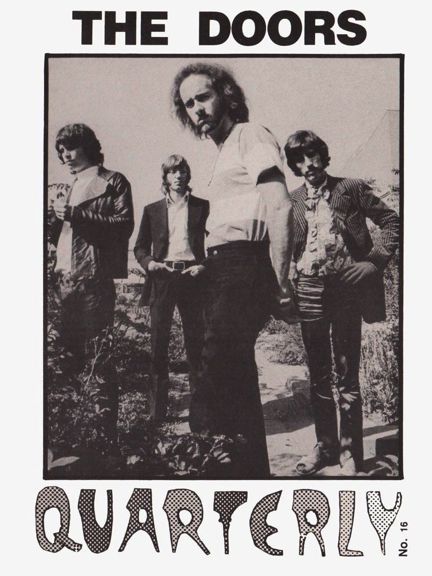| |

Depending
on your computer's safety settings (antivirus, firewall,
etc.)
the download may generate a standard warning, that is
because the
magazine is a flipbook in the .EXE file format. We
guarantee that
the file is absolutely harmless
and perfectly safe. |
|

A new
window will open with the magazine for you to read online
without the need to download it onto your computer.
Again, we guarantee that it's absolutely
harmless
and perfectly safe. |
|
| |
 |
|
Back into the past with The Doors
Quarterly Magazine #16, which got published on December
15, 1987.
Just a few news items here in my 2019 intro for this
issue, mainly the forthcoming Robby Krieger Gibson
guitar, that actually
came out in 1988 as a limited edition. Furthermore, in
addition to this DQ there was the Doors tape and video
list (cassettes
only) Ray Manzarek had asked me to write when he wanted
to see what was out and circulating at the time.
Unfortunately my plans to produce a Doors Interview
Flexidisc (you know -or probably don't- those flexible
7" discs, pressed
on thin plastic) failed, because the costs for
materialising the idea were incredibly high in those
days; I could not afford it.
I guess a fanclub flexi would be quite worth a lot of
money nowadays, right?
I still like my "Merchandising & The Doors"
article, which got illustrated by four girls on page two
wearing some nice -meanwhile
rare- T-Shirts.One of the finest articles of all:
"Jim Morrison, When the Music's over - A personal
remembrance", written by
Jim's friend Tom Baker. I forgot to include the
publishing credits, it was from a magazine called High
Times in June of 1981. It's
interesting to read some details of their first meetings,
their abuse of alcohol, their adventures with strange
groupies, Tom's
flight to Phoenix with Jim and how Tom experienced Jim's
last day in L.A. together with Babe Hill and himself, and
also his
last meeting with Pamela after Jim's death. Recommended
reading!
The famous John Densmore phone interview with Billy
Pinnell from 1985 Part One is featured in this issue,
as is Part One of Scott Hyder's Symbolic Study of Jim
Morrison.
My article series "Bootlegging The Doors" has
become a basic series of writings on how to identify
different pressings of vinyl
records, this time concentrating on one of the most
essential booties, "Mr. Mojo Risin'"; its very
first pressing came from
the USA, published in the winter of 1980.
I'm sorry to say that after publishing we found out that
the "Original Jim Morrison handwriting of 'End of
the Night'" on page 38
was fake. Please do not copy or distribute it saying it's
in Jim's own hand.
For producing this DQ 16 there was no computer around
-everything got typed on my ancient electric typewriter-
and the bigger
letters for headings used to be rub-off letters on small
plastic sheets or plastic lettering tapes. There was a
free (old) poster with
it, but I forgot which one of the about 20 different DQ
posters available I had used for DQ 16. It came along
with a small book
listing about 150 different Doors cassette tapes (I still
own all of my old cassette tapes, btw.).
Enjoy your digital version and let us know what you think
... we will continue soon by publishing a digital version
of DQ 15.
Thanks to Kevin Chiotis for all of his work!
A splendid time is guaranteed for all!
Please note that your digital copy of The Doors Quarterly
Magazine 16 hasn't been altered in any way. You get it as
it was
published in December 1987 (!). Be aware that all
addresses (private, phone including my own address in
this issue on page 3)
are certainly no longer valid anymore. Books, vinyl
records, CDs and other stuff might not be available
anymore. Please do not
respond to any of the small ads or blame anyone for
incorrect details - all writers just did the best they
could do back in late 1987.
And all this happened without any computer, without any
emails and of course without the internet.
PS: ... if you would like to obtain an original paper
copy of this Doors Quarterly Magazine 16 I have to tell
you that
unfortunately there are no copies left at all!
Thank you!
Rainer Moddemann.
In memoriam: Paul Carter and Ulrich Heumann, two of the
biggest Doors fans I have ever known. |
|

